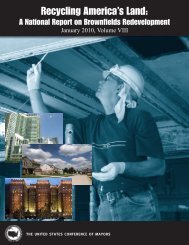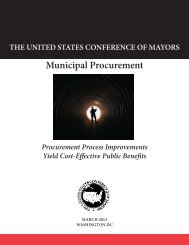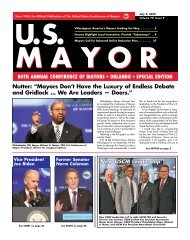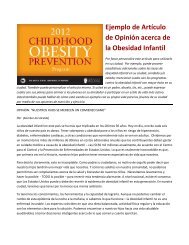download a full PDF edition of this issue of US MAYOR.
download a full PDF edition of this issue of US MAYOR.
download a full PDF edition of this issue of US MAYOR.
You also want an ePaper? Increase the reach of your titles
YUMPU automatically turns print PDFs into web optimized ePapers that Google loves.
WASHINGTON OUTLOOKBy Laura DeKoven WaxmanAs has been widely reported, on April18 the bipartisan “Gang <strong>of</strong> Eight” introducedthe Border Security, EconomicOpportunity and Immigration ModernizationAct (S. 744) in the Senate.The eight drafters are Senators CharlesSchumer (NY), John McCain (AZ), RobertMenendez (NJ), Lindsey Graham (SC),Marco Rubio (FL), Richard Durbin (IL), JeffFlake (AZ) and Michael Bennet (CO). TheSenate Judiciary Committee quickly heldthree hearings on the bill and ChairmanPatrick Leahy (VT) announced that heplans to markup the bill early in May andbring it to the floor in June.Based on an analysis by the NationalConference <strong>of</strong> State Legislatures, the billwould:• Establish the Comprehensive ImmigrationReform Trust Fund with an initialfederal outlay <strong>of</strong> $6.5 billion to beused for border security. The fund willbe sustained through various visa feesand penalties. This funding is designatedas emergency funding, wouldnot violate spending caps, and wouldbe available for ten years.• Initiate a comprehensive border securityprogram that includes 3,500additional U.S. Customs and BorderProtection Officers, funding for stateand local law enforcement through theOperation Stonegarden Program andfor interoperable communication forfederal, state, and local law enforcement,and reimbursement to state andlocal governments for costs associatedwith prosecution and pretrialdetention <strong>of</strong> federally initiated criminalcases declined by local U.S. Attorney’s<strong>of</strong>fices.• Reauthorize the State Criminal AlienAssistance Program (currently fundedat $240 million) through 2015.• Ensure that the enforcement <strong>of</strong> civilBipartisan ImmigrationReform Bill Moving Quicklythrough Senate JudiciaryCommitteeimmigration law is a responsibility <strong>of</strong>the federal government by providingenhanced training for federal bordersecurity and immigration <strong>of</strong>ficers.• Establish a Border Oversight Task Forceto review and make recommendationson immigration and border enforcementpolicies and strategies. State andlocal government would have five seatson the commission – two from thenorthern border region and three fromthe southern border region.• Mandate E-Verify for all employerswith a five-year phase-in, beginningwith federal contractors. A nationalID card would be specifically prohibited;identity verification throughenhanced fraud-pro<strong>of</strong> documentswould be required. States could voluntarilysubmit driver’s license photosto the federal E-Verify system, andthose that voluntarily participate couldbe reimbursed through a $250 milliongrant program.• Create a new guest worker-type visa,the “W” visa, for jobs requiring lessthan a bachelor’s degree, and reformthe high-skilled visa system.• Restructure and replace current H-2Avisa systems with an Agriculture WorkerProgram and create a process forunauthorized agricultural workers inthe United States to gain legal statusthrough a new “blue card” temporaryresidency program.• Create a path to legal status andcitizenship through the creation <strong>of</strong>a Registered Provisional Immigrant(RPI) status. RPI status would be availableto individuals who meet eligibilitycriteria after paying a fee andpenalty and submitting a completedapplication. Eligibility requirementswould include demonstrated continuousphysical presence in the UnitedStates on or before December 31,2011; not being convicted <strong>of</strong> any seriouscrime; and not having a federaltax liability. Initial registration wouldbe valid for six years. RPIs would thenhave to apply for renewal, whichwould require a background check,additional fees, and a fine, along withpro<strong>of</strong> <strong>of</strong> employment and pro<strong>of</strong> thatthey will not become a public charge.After ten years, RPIs could applyfor an adjustment in status, such asLawful Permanent Resident (LPR) and,after three additional years, apply fornaturalization. They would need topay fees and fines, demonstrate pro<strong>of</strong><strong>of</strong> employment and English languageacquisition, pass a background check,and meet other requirements.• Allow individuals who were broughtto the United States as children beforethey were 16 and completed highschool or a GED to be eligible forRPI status (DREAMers). Individualswho received Deferred Action forChildhood Arrivals would be grandfatheredinto RPI status. DREAM RPIswould be exempt from penalties andtriggers and are eligible to adjust toLegal Permanent Resident or naturalizeafter five years. Children under16 would not be included and wouldhave a separate set <strong>of</strong> criteria for theirpath to citizenship.• Address the visa backlog by creatinga new merit-based visa program thatwould award points to individualsbased on several factors, includingemployment, education, and length<strong>of</strong> United States residence. No onewith RPI status would be allowed toSee IMMIGRATION on page 14usmayors.orgApril 29, 2013 U.S. <strong>MAYOR</strong> Page 13











